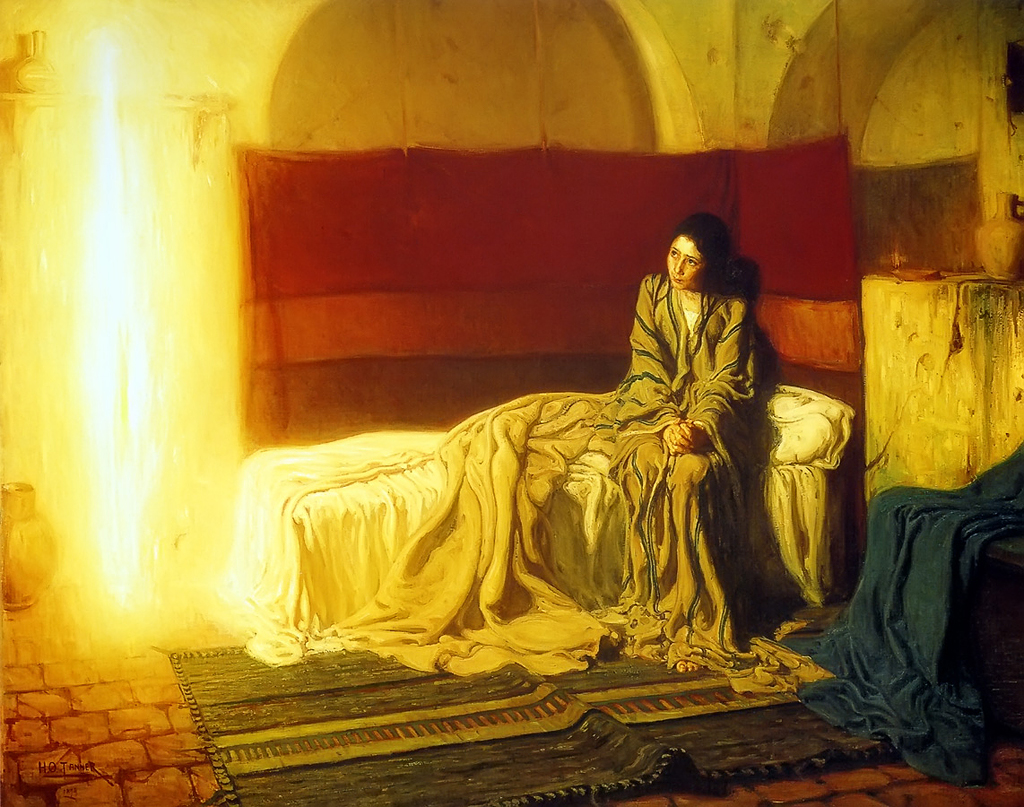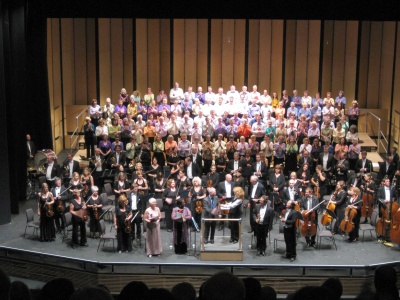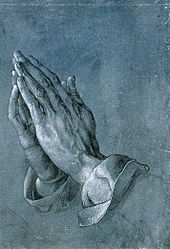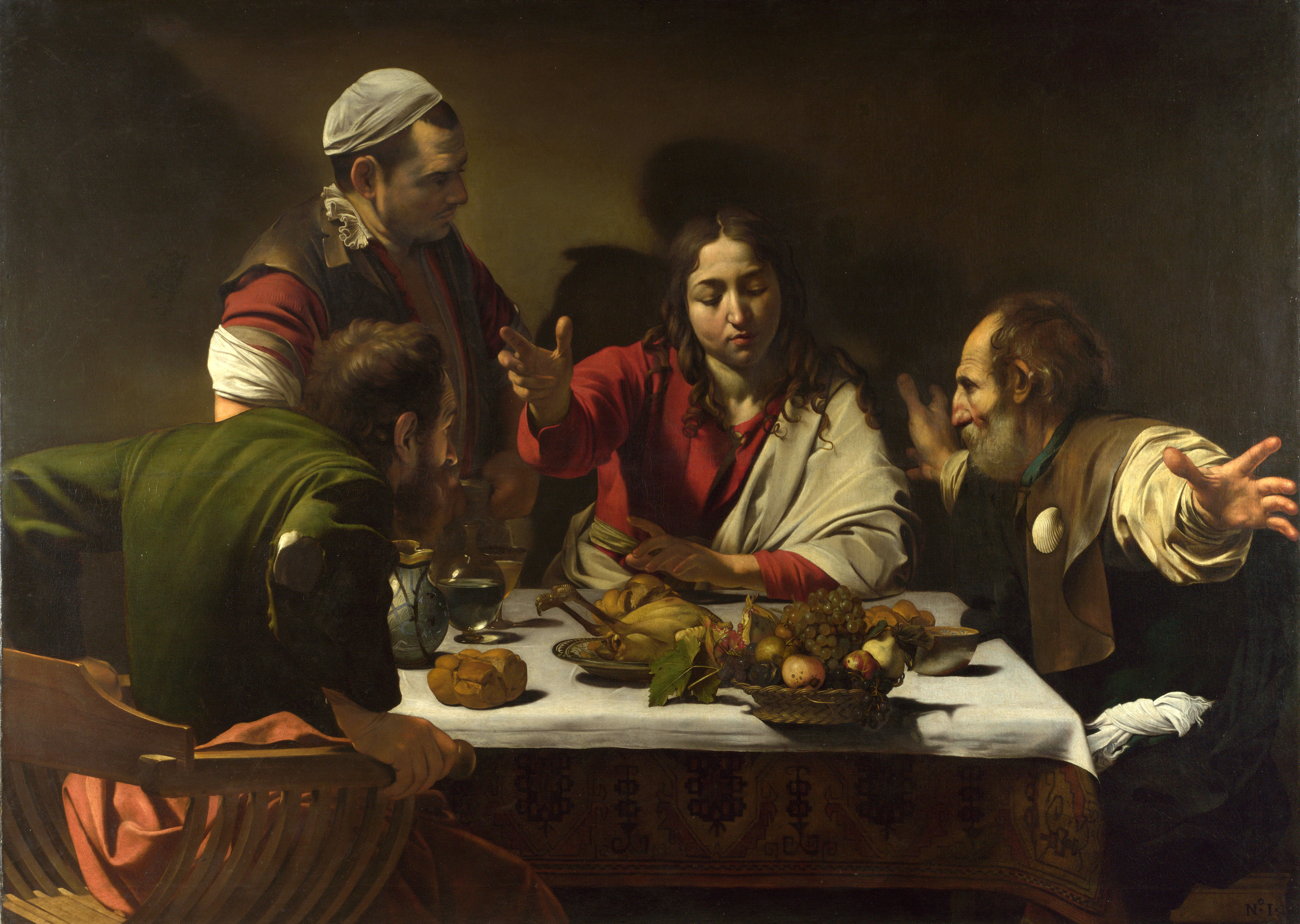 |
| The Annunciation - Henry Ossawa Tanner |
And so in today’s gospel passage we go back in time in terms of the Christmas story, to events nine months before the birth of Jesus – back to March as it were. Back to the time of Mary’s waiting, for something genuinely new to happen, for something amazing to come into the world through her.
Now waiting and babies go hand in hand. They never come when you expect them. Doctors and midwives like to give due dates, but they’re estimates at best, even though they shape our expectations. Both our children were born about ten days after their due date, and I vividly remember the time we were waiting for our son Gregory to arrive. Everything was on hold, my parents were staying to be with our daughter when the baby was born so the house was full, Becky was getting increasingly uncomfortable. We were ready. I kept thinking of Jesus’ teaching about being watchful and not knowing the day or the hour of his coming (dads can think about that sort of thing, not actually having a huge baby inside them) – and as an aside it was only after we’d chosen his name that I found out that the word for watchful is where we get the name Gregory. So we watched. We were ready. We waited.
I can well imagine that was how things were for Mary when she was waiting for Jesus to be born. Was that how it was for her before she heard about the news of the birth? Going by Luke’s account, we don’t know anything about her life up to that point, except that she was betrothed to Joseph but not yet married, which took place a year after betrothal. Given the pattern of the times, she was probably a teenager. There are plenty of later thoughts about her. The early church had the tradition that her mother Anne had been barren, prayed to God for a child and became pregnant in her later years, whereupon she dedicated Mary to life in the temple – so that according to this tradition Mary grew up surrounded by the ideas and practices of the temple. This isn’t an idea you’ll find in the Bible, but it’s found in a number of written works from the first few centuries after Christ and subsequently in the Muslim holy book, the Qu’ran, which has a lot to say about Mary.
So she might have been deeply reflecting on God’s calling for her, preparing for something to happen in her life. But that’s speculation. She might just as much have been doing the everyday stuff, or planning for her wedding, or having a bit of a rest. And then, all of a sudden, an angel comes to her. How did she know he was an angel, not just some bloke? She didn't, and we don’t. There’s no mention of miraculous appearance, or wings, or heavenly lights, the kinds of things we associate with angels. In the first place, an angel is a messenger from God, and earlier in Luke we’re told in rather lovely words that he stands in the presence of God. We’re told by Luke that the angel’s name was Gabriel, which partly because of this passage is a name that Christian tradition (and indeed Jewish and Muslim tradition) has run and run with. Quick one for your next pub quiz: how many times does the name Gabriel appear in the Bible? Four times is the answer – here, earlier in Luke where Gabriel appears to Zechariah, father of John the Baptist, and twice in the book of Daniel. Really, he’s not a major character. And he doesn’t announce himself to Mary by name anyway.
So Mary doesn’t know a lot about this person who greets her. Which makes it not so very surprising that when he calls her favoured one, and says the Lord is with her, and even (according to some translations) says that she is blessed among women, her first reaction is “y’what?”. She is, to put it more politely, perplexed. Flummoxed. Surprised. Incredulous. Because this is turning out to be a far from ordinary day.
But notice this: before she gets any news of her great task, she’s told that she is blessed and favoured by God. And she hears this straight from the source, from a messenger who stands in the presence of God. Now how good is that? It’s news we all need to hear. But of course it’s news that we can find throughout the Bible. We are blessed by God, we are God’s favoured ones. Genesis tells us that we are made in the image of God, that we have life breathed into us by God. Much of the Old Testament is about God’s blessing upon a people who do or don’t want to know. And it’s absolutely the central message of Jesus. He tells us that he came so that we might have life, and have it to the full. He showed us in his life, through his teaching, through his death, that we are blessed by God. So if you feel sad or worried or are losing hope, remember that the words of the angel to Mary apply to you, apply to me, apply to us all: “Greetings, you who are highly favoured! The Lord is with you. You are blessed by God.”
And Mary – Mary waits. So the angel goes on. And now he tells her the news that to us, 2000 years on, is incredibly familiar, but to her must have been mind-blowing. She’s going to have a baby. And not just any baby, but one who is going to be truly great, to sit on the throne of David, to reign forever, to be called the son of the Most High, even to be holy and to be called the Son of God. These are royal titles, they’re the kind of titles that the Roman Emperor gave himself. To us, the term Son of God is associated solely with Jesus, but emperors were forever being called son of God. But very clearly these are not the sort of titles you expect for the baby of a young woman from nowhere in particular.
And then finally Mary reacts – from incredulity about the greeting to incredulity about the mechanism. Because of course, she says, she’s a virgin. Now the idea of a virgin birth is something totally outside of normal human experience. For many people throughout church history, it’s a central idea for seeing Jesus as fully human and fully divine, and to question it is heresy of the worst sort; for many people today, it’s too bizarre to be taken seriously. There are also sound biblical reasons to doubt it. I don’t really know what I think about how Mary conceived Jesus. Maybe it’s just a metaphor for an ordinary conception given especial holiness. But if God is going to carry out an extraordinary act, he certainly could have chosen to do it by extraordinary means.
And actually, I don’t think the mechanism is the interesting part about it. In ancient Jewish teaching, the question about any story was not “what actually happened?” but “what does this teach us?” And the angel gives us the clue – that the Holy Spirit is acting especially in the world, is breathing life into this child just as God has always done, but a life that is fully divine as well as fully human. The angel in Matthew’s gospel quotes the book of Isaiah, and gives the child the title of Emmanuel, which means God-with-us. That is the reality of the incarnation – God is taking on human flesh. This baby is to be a human being, but he is also going to be God.
And that brings me to a deeper layer of meaning. By taking on human flesh, God fundamentally changed the nature of the world. And by giving us the gift of the Holy Spirit at Pentecost, he fundamentally changed the nature of those who follow him. Our ridiculous, vulnerable, frail human flesh has been given the greatest possible seal of approval by God: he chose to wear it. But we, the church, the followers of Jesus, are the now the body of Christ, that self-same incarnated body. So we have a responsibility continually to bring about that incarnation in our own lives. I really like the words of the German 14th century mystic, Meister Eckhart, who in a Christmas sermon once proclaimed:
What good is it to me if Mary gave birth to the Son of God 1400 years ago, and I do not also give birth to the Son of God in my time and in my culture? We are all meant to be mothers of God. God is always needing to be born.I find that an amazing calling – to be part of bringing God into the world, here and now, continuously. To be a mother to God, whether or not you’re a mother (or even capable of being a mother) to human life. In the Eastern Orthodox church, Mary is referred to as the God-bearer. We are all called to be bearers of God. Just as heaven is not something to be experienced after death but in the here and now, so too the incarnation is not something that happened once and never again, but goes on happening again and again.
Of course what Mary did was to give birth to God in a very particular and unique way. She was the pioneer, the one who went before us all to make it possible for us to come to know God. Mary was not a passive vehicle. She was an active agent in all this. Her response might sound quite passive in some ways, quite submissive. And many of the classic images we have of Mary do show her as quite submissive. But I think her response is more like a shout of acclamation. Let it be so! Yes I will! This thing is going to happen!
And there’s something important going on here in how she is addressed and responds. Many scholars observe that the structure of what the angel says to Mary exactly parallels the way in which the prophets in the Old Testament were called. There is a greeting, a startled reaction, an exhortation not to be afraid, a divine commission, an objection, a reassurance, and the offer of a confirming sign. This is the way Moses was called by God, it’s the way Isaiah was called, it’s the way Samuel was called. Mary’s response to the angel of “Here I am” even echoes the response of Samuel. There’s really compelling evidence here that Mary’s encounter with the angel is a prophetic calling, that Mary herself is a prophet.
And the next words we hear from Mary are undoubtedly prophetic words – the extraordinary song that we call the Magnificat, where Mary speaks of God’s power and his justice, of the world turned upside down, of the powerful brought low and the hungry fed. These are a vision of an alternative kingdom. It is a vision which Jesus brought into being fully, with the coming of the kingdom of God through him, but it is a vision which was first given to Mary.
Now Protestants rather under-rate Mary – she’s such a major figure in Catholic spirituality that many Protestants have put her to one side, just to be brought out at Christmas time, and maybe Easter, as a rather peripheral figure to the story. But this passage shows us Mary can be our model, our teacher – the one who heard the angel’s assurance that she was blessed by God, the one who was perplexed at first and asked searching questions, but then understood her calling and responded to it with a great YES! The one who participated with all her body and her heart and her soul in bringing God to earth. And the one who was willing to see God’s coming kingdom in all its fullness of life.
And Mary waited, ready for the time to come.
And so this is my hope and my prayer: that we all, this Christmas time, might be willing also to act as bearers of God, as agents for bringing God into the world through our lives and our actions, and that we might be willing to listen to the angel, and to see the upside-down kingdom of God in all its glory. That we might wait as Mary did, and might participate in the incarnation of our Lord, here and now, in this place and in everything we do. Let us all be willing to say with Mary: “Here am I, the servant of the Lord; let it be with me according to your word”.
Amen.



















